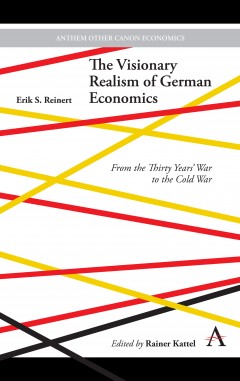The Visionary Realism of German Economics
From the Thirty Years' War to the Cold War
By Erik S. Reinert
Edited by Rainer Kattel
Other Formats Available:
E-Book- About This Book
- Reviews
- Author Information
- Series
- Table of Contents
- Links
- Podcasts
About This Book
‘The Visionary Realism of German Economics’ forms a collection of Erik S. Reinert’s essays bringing the more realistic German economic tradition into focus as an alternative to Anglo-Saxon neoclassical mainstream economics. Together the essays form a holistic theory explaining why economic development––by its very nature––is a very uneven process. Herein lie the important policy implications of the volume.
Reviews
"Almost but not quite alone, Erik Reinert has for decades tended the flame of an economics based on history and the urban, industrial, developmental state. These essays assemble his prodigious scholarship on the German tradition, a labor of love and dedication with enduring relevance, especially in today's Europe, dominated by a Germany alienated from centuries of her own ideas.”
—James K. Galbraith, Lloyd M. Bentsen Jr. Chair in Government/Business Relations, LBJ School of Public Affairs, and Professor of Government, University of Texas at Austin, USA, and Author of The End of Normal: The Great Crisis and the Future of Growth
“Erik Reinert’s 20 essays on three centuries of German economics are a remarkable work of scholarship by an outside observer. They highlight the focus on the role of the state and on development as well as the less abstract methodology and the interdisciplinary tradition as distinguishing characteristics. The book is strongly recommended to every reader longing for an economics which is not only rigorous but also relevant for solving the problems of the real world.”
—Harald Hagemann, Professor of Economic Theory, University of Hohenheim, Germany
“This important book reveals how the Anglocentric approach has impoverished both recognized economic thought and the profession of economics. Over three centuries, writers of the German Historical School made relevance (not available tools) the starting point for economic analysis and so incorporated insights from many other fields of knowledge. Reinert’s wisdom and erudition showcased here have immense methodological significance not just for economists but for all social scientists.”
—Jayati Ghosh, Professor of Economics, Jawaharlal Nehru University, India
“If Standard Textbook Economics does not work (and it doesn’t), then the classic older German tradition, with its committed insistence on realism rather than on self-referential modeling, is one of the best alternatives to check out. Erik Reinert, one of the most distinguished, erudite and solution-focused experts on the topic today, presents us here with this cornucopia of usable knowledge for the 21st century.”
—Wolfgang Drechsler, Professor of Governance, Ragnar Nurkse Department of Innovation and Governance, TalTech, Estonia, and Associate, Davis Center, Harvard University, USA
Author Information
Erik S. Reinert is Professor of Technology Governance and Development Strategies at Tallinn University of Technology, Estonia, and also Chairman of the Other Canon Foundation in Norway. He holds a BA from Hochschule St. Gallen, Switzerland, an MBA from Harvard University, and a PhD in economics from Cornell University. For almost 20 years he ran a manufacturing company producing in three European countries. This background brought Reinert close to economics as a “science of practice” (Erfahrungswissenschaft). Lecturing in five languages, Reinert’s work has taken him to more than 65 different countries. His book How Rich Countries Got Rich … and Why Poor Countries Stay Poor, published in more than 20 languages, was shortlisted by the World Economics Association in 2016 for inclusion among the 10 most important economics books of the last 100 years.
Series
Anthem Other Canon Economics
Table of Contents
Introduction; Chapter 1 German Economics as Development Economics: From the Thirty Years’ War to World War II; Chapter 2 The Role of the State in Economic Growth; Chapter 3 A Brief Introduction to Veit Ludwig von Seckendorff (1626– 1692); Chapter 4 Exploring the Genesis of Economic Innovations: The Religious Gestalt- Switch and the Duty to Invent as Preconditions for Economic Growth (with Arno Daastøl); Chapter 5 Johann Heinrich Gottlob von Justi (1717– 1771): The Life and Times of an Economist Adventurer; Chapter 6 Jacob Bielfeld’s “On the Decline of States” (1760) and Its Relevance for Today; Chapter 7 Raw Materials in the History of Economic Policy; or, Why List (the Protectionist) and Cobden (the Free Trader) Both Agreed on Free Trade in Corn; Chapter 8 Compensation Mechanisms and Targeted Economic Growth: Lessons from the History of Economic Policy; Chapter 9 Karl Bücher and the Geographical Dimensions of Techno- Economic Change: Production- Based Economic Theory and the Stages of Economic Development; Chapter 10 Austrian Economics and the Other Canon: The Austrians between the Activistic- Idealistic and the Passivistic- Materialistic Traditions of Economics; Chapter 11 Nietzsche and the German Historical School of Economics (with Sophus A. Reinert); Chapter 12 Creative Destruction in Economics: Nietzsche, Sombart, Schumpeter (with Hugo Reinert); Chapter 13 Schumpeter in the Context of Two Canons of Economic Thought; Chapter 14 The Role of Technology in the Creation of Rich and Poor Nations: Underdevelopment in a Schumpeterian System; Chapter 15 Towards an Austro–German Theory of Uneven Economic Development? A Plea for Theorising by Inclusion; Chapter 16 The Qualitative Shift in European Integration: Towards Permanent Wage Pressures and a ‘Latin- Americanization’ of Europe? (with Rainer Kattel); Chapter 17 Primitivization of the EU Periphery: The Loss of Relevant Knowledge; Chapter 18 Mechanisms of Financial Crises in Growth and Collapse: Hammurabi, Schumpeter, Perez, and Minsky; Chapter 19 Full Circle: Economics from Scholasticism through Innovation and Back into Mathematical Scholasticism: Reflections on a 1769 Price Essay: “Why Is It That Economics So Far Has Gained So Few Advantages from Physics and Mathematics?”; Chapter 20 Werner Sombart (1863–1941) and the Swan Song of German Economics; Index.
Links
Stay Updated
Information
Latest Tweets



